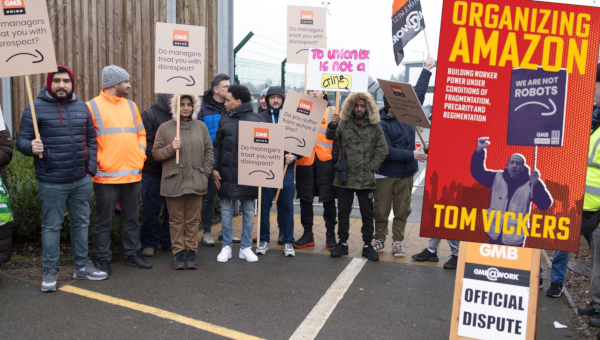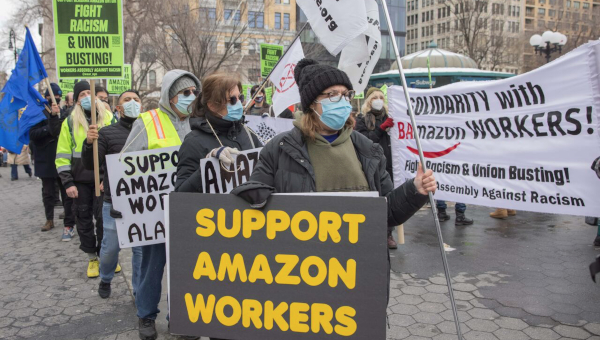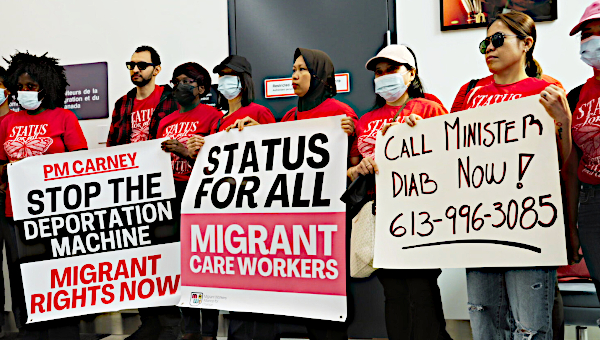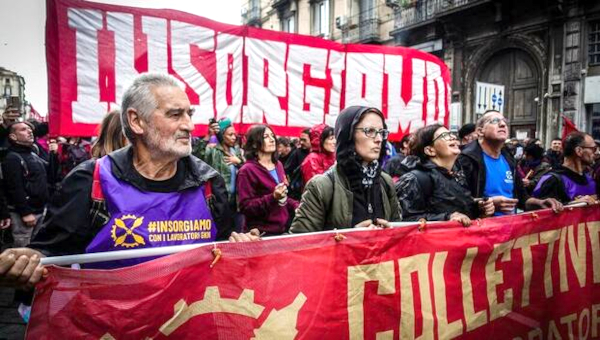A New Trade Unionism in the Making?
As the financial crisis has mutated in its latest phase into a crisis of public sector finances and debt, a fundamental attack on public services and public sector unions has been evolving across the advanced capitalist countries. Such attacks have been characteristic features of neoliberalism. But in this new more authoritarian phase of neoliberalism the cuts to services have been more aggressive and the assaults on public sector unions and rights quite unprecedented.
The response of the union movement has been most often, especially in North America, confused, disorganized, reactive and accommodating. In the inspiring fightback over the last months in Wisconsin, the importance of class mobilization and class struggle to respond to the ruling class attacks on working peoples has regained popular resonance. But the renewal of a union movement capable of winning the most basic struggles over wages and working conditions, not to speak yet of being a vital part of contesting political power, remains still uncertain.
A trade unionism that is able to facilitate and express the practical knowledge of its members, as workers and as citizens, is critical to the renewal of public services and for confronting a global politics of austerity. Hilary Wainwright has been at the forefront of such attempts to forge a new public sector unionism for some time. She has attempted to link the struggle over the state with the building of the popular power and democratic capacities necessary for a renewal of unionism, and also the socialist project. We are at the beginning of what will likely prove to be a long phase of public sector struggle in Canada and the U.S. The Bullet publishes here a recent contribution by Wainwright to the debate on union renewal. There is a need for many more such interventions, from a variety of perspectives, from militants and activists in North America as part of the coming battles against the ruling classes’ attempts to forge a new ‘age of austerity.’
It’s exciting to contribute to a discussion where trade unions are moving on to the high ground and proposing alternatives, in alliances with groups sharing a common interest in quality public services. I want to explore lessons we can draw from practical experiences of such strategic trade unionism. But first a point about the context. We face the extraordinary situation in which what began as a crisis of the financial markets, and the institutions that drove them, has now become a crisis of public spending to be solved, it is argued, through cutting back on social provisions. We need to have some explanation of this process to develop effective strategies – both in the short and long term.
I want to focus on the implications of one part of the explanation which I think has a special importance for the distinctive role of trade unions – in particular public sector trade unions – in the coming years.
A key factor that allowed the dominant narrative to move from a financial crisis, to a political bailout, to the current crisis of public spending and cuts in social provision was an absence of sustained mainstream voices articulating the values and goals of public good and societal needs. There was no effective counterpoint to the pressures and imperatives of the corporate market. I’m not talking here about a radical socialist programme, all I mean is a greened social democracy that meant it.
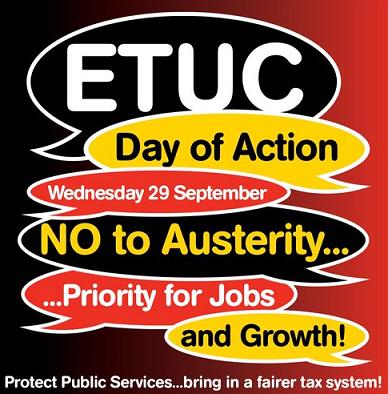 A key moment in this process was the weakness and ultimate marginalization of voices in the U.S. and in Europe arguing for the billions spent to save the financial institutions to be used to initiate a dynamic of democratically directed investment toward goals of environmental sustainability and social and employment justice. This was a political weakness – especially in the U.K. and the U.S. – at the very moment when briefly, political institutions had real bargaining strength vis-à-vis financial power.
A key moment in this process was the weakness and ultimate marginalization of voices in the U.S. and in Europe arguing for the billions spent to save the financial institutions to be used to initiate a dynamic of democratically directed investment toward goals of environmental sustainability and social and employment justice. This was a political weakness – especially in the U.K. and the U.S. – at the very moment when briefly, political institutions had real bargaining strength vis-à-vis financial power.
This de facto defeat for democratic public intervention at a decisive moment, consolidated the fundamental neoliberal notion that public spending, especially on social provision, holds back the private sector, the sacrosanct driver of the economy. This was given weight by neoliberal theoretical notions such as ‘crowding out,’ a ‘fiscal burden,’ and others. In other words, the financial crisis is completing the delegitimization – within the political and media institutions – of the economics of social need and public goods; the economics of the non-commodified sphere that has since 1945 existed as a compromise within capitalist economies.
This process of marginalization must be understood, in part at least in the North, as associated with the structural inability of social democratic and Euro-communist parties to renew themselves in the 1970s and 1980s in order to improve, extend and support innovation in the public services which they helped to create. Instead we have seen their defensive acquiescence in the treatment of public goods as secondary.
Filling the Political Vacuum?
In the context of this vacuum and its regressive consequences, the role of the trade unions, beginning with the public sector unions, is potentially central. The unions are in many countries the largest, best resourced, most stable, most institutional, and in some respects most rooted (with all the ambivalences and problems which such characteristics imply) movements in civil society.
These attributes give them the potential to be, as Carmen Sosa, a water workers leader in Uruguay, suggests “the vertebral column of the popular movement.” Unions can facilitate the organization of knowledge, practical actions, expert research, and popular expression, of the mass of people to defend social needs and ensure the means of meeting them.
It is through this role as the backbone (recognizing the autonomy but connectedness of the vertebrae), of building social alliances around the defence and improvement of public services and resources, that unions could fill the political vacuum. I will explore later what “filling the political vacuum” could mean.
I stress this role as a potential because in the North at any rate, the unions have tended to have a quite rigid division of labour between the industrial and the political activities of the labour movement, abrogating wider social, not immediately industrial issues, to the ‘political or parliamentary wing.’ At the same time they have closely guarded their role in collective bargaining and industrial action – whose scope, with historically important exceptions, is generally narrowly defined. This has meant all too often, especially at a national level an intellectual subordination to a neoliberal social democracy – social at the margins, neoliberal at the core.
There are signs that some unions or parts of unions are disentangling themselves from these subordinate relationships with political parties and through working with other allies, in social movements, amongst critical intellectuals, contributing to a rethinking of both politics and trade unionism. It is not entirely new (compare the 1970s in many countries) and is shaped by memories and traditions. It is uneven, fragmented and scattered; to be learnt from and understood, not exaggerated. Any generalizations can only be tentative.
The Politics of Alternatives to Privatization
I want to take two examples of successful struggles against privatization – acknowledging that all such successes are precarious, cautiously to explore what is involved in this notion of trade unions playing a role in “filling the political vacuum.” These are the international struggles over water as a public good and the resistance in several localities to the privatization of local services on the basis of democratic alternatives. For though both these examples involve electoral politics and a challenge to the existing political institutions, this is on the basis of a distinct and autonomous base of political values, goals and forms of organization.
Participatory Politicization
1. Water
There are many levels to the success of campaigns for public water – 90% of water is in public hands in spite of determined efforts at privatization. One dimension has been the ability and willingness of trade unions to move from defensive concerns with their members’ jobs and working conditions, to take up the wider public interest in water as a commons, to be democratically owned and managed and to be accessible to all.
In many contexts they have then thrown themselves, at different levels, into facilitating, supporting and sometimes co-leading a popular alliance against the marketization of water. In effect they have been part of processes of what could be described as participatory politicization.
What I want to highlight with this concept is that privatization involves a systematic process of depoliticization of the fate of public services. Even when neoliberalism was at its most ideological, for example under Margaret Thatcher, privatization of public services, was never presented as an election issue, to be debated politically and voted upon.
In two countries where the movements against privatization have been notably strong, Brazil and Uruguay, the governing parties of the 1990s never made the privatization of water a part of their election manifestos, even though that is exactly what, under pressure from the IMF, they attempted. Privatization is always referred to by politicians and the sympathetic media in the most euphemistic, depoliticized manner. The talk is of ‘opening up new markets,’ ‘restructuring state assets,’ ‘diversity of providers,’ ‘what matters is what works,’ and so on.
The significance of the role of the trade unions in leading or co-organizing alliances against the privatization of water on the basis of its importance as a public good is that these alliances have given expression to underlying beliefs in the distinct value of public goods; beliefs that otherwise have little or no mainstream expression, let alone influence or power.
In the case of the U.K., the unions mobilized a voice, a set of counter-arguments that gave confidence and a language to the instinctive recognition that water should not be treated as a commodity. Even after Mrs. Thatcher had driven it through, opinion polls showed 89% of the public against it.
In Brazil and Uruguay, those values were also the basis of mobilization of considerable power inside and outside the workplace. They were also the basis of staff and citizen participation in improving the way that public water companies were managed.
Another distinctive feature of the struggle to reclaim public water has been its international character. This has been vital to its success in the face of an international drive to privatize involving both international financial institutions, most notably the IMF and transnational water corporations like Suez. Crucial here has been the creative and practical role played by Public Services International, supporting local and national struggles and playing a leading role in establishing the international campaigning network, Reclaiming Public Water.
2. Local government
The same process of participatory politicization, and the role of the unions in facilitating it, has been a distinctive feature of several successful struggles against the privatization of local government services. These services had again been depoliticized as supposedly ‘technical’ and hence opaque, to facilitate a behind-the-scenes process of contracting out.
In Trondheim, Norway and Newcastle, England, a key part of the anti-privatization struggle was to open up municipal decision-making to public scrutiny and debate.
In Trondheim, the local trade union federation made privatization the central election issue, involving their members in developing an alternative programme for public service reform. They made this the basis of an election campaign against the parties that had privatized many of the council. Following the defeat of these parties they then worked with the municipal workers union nationally to develop the Model Municipality – a strategy of public service improvement based on staff and management sharing knowledge on how to improve the services, involving community organizations in the process and negotiating with elected politicians.
This process eventually became the model for an effective national campaign against privatization, which won the support of an alliance of the Labour Party, pressured for the first time to work with the radical Left Socialist Party. This alliance won the elections in 2005, helped in part by the challenge to neoliberal policies mounted by the unions.
In Newcastle, in the North of England, the unions’ strategy of politicization was to challenge the pervasive process of contracting out and where they couldn’t halt it, to open it up making every stage a matter of visible, contested political choices, insisting that there was a public alternative that would be better value for the municipality than privatization.
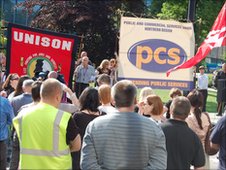
This strategy had several levels: city wide campaigns bringing together unions and community groups; an extension of collective bargaining to include the tendering and contracting process and more generally questions of management and service improvement; and finally an emphasis on the participation, training and development of staff. The union’s strategy was based upon seeing its members as knowledgeable and committed providers of public services. This approach required workers’ employment and conditions to be secure – as only then would staff feel confident to share this knowledge and commitment as the basis of public service improvement.
Kenny Bell the secretary of the UNISON branch in Newcastle explains: “The benefits of people being more involved in their work is widely understood in terms of higher quality performance and so on but what is not recognized, and in many contexts does not exist, is the role that a union can provide as guarantor and security.” In Newcastle that meant winning a commitment to avoid compulsory redundancies; it meant management knowing, as a senior manager in Newcastle put it, “I was under no illusion that if we got things wrong and if we didn’t respond, Kenny would escalate the issue.”
“But what was distinctive was that these alliances had their own autonomous political perspective; indeed this was their source of strength and wider impact.”
This process of participatory politicization is clearly a very different process from the lobbying campaigns through which trade unions have traditionally pressed political parties to take up their political demands. In the cases of both water and local government, the campaigns engaged with, challenged and changed the decisions of political parties and in Uruguay, Brazil, and Norway they contributed to electoral change nationally.
But what was distinctive was that these alliances had their own autonomous political perspective; indeed this was their source of strength and wider impact. The cases that I’ve discussed are in some ways unusual; how far are they ahead of their times; a sign of a tendency likely to spread?
Political Traditions and Organic Connections
What factors explain the political character of the unions in these cases? In Uruguay and Brazil, the unions involved in the movements for public water had learnt their politics and developed traditions of collaboration with other social movements through resisting dictatorships. But the spirit of these traditions were rekindled by the relationship of water workers to those who use the water. “For us, the problems of water in rural areas is very sensitive” explained Adriana Marquiso, former president of the water workers union in Uruguay. “There are staff of the public water company (OSE) even in the smallest rural towns. They grew up there, they live there, and they are part of the affected population. Water is too vital for water provision to be treated as any other job.”
For the water union, the threat of privatization activated and politicized the connection between their members as workers and as citizens. It built on pre-existing openness to the union playing an autonomous political role, based on its participation in the movement against the dictatorship.
In Newcastle, the local UNISON branch too had organic reasons for a close connection to the citizens organizations and a pre-existing tradition of autonomous politics.
The basis for an organically close connection to community organizing and building wider alliances lies in the nature of the workforce. Over 70% of UNISON members are women and many of them are part-time. Their priorities bridge community and workplace. When the Newcastle branch did a survey of their low paid women members, to identify priorities for collective bargaining, the response showed that access to good quality free or low cost child care was their top priority.
This kind of work-community connection, integral to the changing nature of the workforce, provides a basis on which some unions are already seeking to change and extend their organizations beyond the workplace.
Newcastle UNISON too developed an autonomous politics resisting the economic dictatorship, if that is not too strong a word, of the unregulated capitalist market. In the 1980s, the branch developed strategies for service improvements working with the local tenants’ federation. They extended collective bargaining to include social priorities within public tenders which private bidders could not meet.
Valuing such autonomous political traditions and building on their legacy will be an important part of building a politically minded trade unionism to take on 21st century privatization.
The Democratization of Knowledge
A distinct understanding of knowledge and its organization is fundamental to participatory politicization. The traditional division of labour between the industrial and political wings of the labour movement was historically underpinned by a very restricted, notion of knowledge as social scientific laws known only to experts. The practical know-how of the frontline worker or the insights of service users embedded in their experiences and desires were not considered legitimate sources of knowledge.
There is now a more pluralistic understanding of what and whose knowledge matters, but there is still little recognition of the significance – including by trade unions themselves – of the knowledge of organized workers and of other social movement actors.
From the experiences of resisting privatization of water and of local government, I would point to two key areas where this plural understanding of knowledge can play a critical role in the struggle for quality public services.
First, the importance of the overview, or in reality underview, that organized workers have of a workplace, municipality or service and it users. This can often be superior to the knowledge of public sector management, fragmented by siloed organization, competitive empires and bureaucratic vested interests. This isn’t to imply that unions are knowledgeable saints; but that where they well organized, cohesive and motivated, their ability to share knowledge of the requirements and possibilities of service improvement is impressive.
Secondly, I want to point to the importance of research that values knowledge embedded in experience and based on a close relationship between researchers and workers and communities engaged in resistance and alternatives. In the case of the movement for public water, for example, this kind of collaboration between the Public Services International Research Unit (PSIRU) and popular alliances resisting privatization has been vital to the development of international strategies necessary to expose and challenge the international coordination of leading water corporations.
The integration of different kinds of knowledge has also stimulated a creativity in developing alternatives. One example is the development of Public Public Partnerships for improving public services, which have built on experiences of solidarity between trade unionists and citizens and municipalities and provided both a focal point for resistance to privatization as well a practical workable alternative for making necessary improvements to public services.
Relational Collectivity:
Beyond the Atomized Individualism of the Market
Talking of creativity bring me to a final point about the distinctive kind of politics that is emerging in alliances between trade unions and citizens organizations. It concerns the relationship between individualism and collectivity. The distinctive kind of politics involves a distinctive notion of collectivity in which the realization and contribution of each individual is a condition for the realization and contribution of all.
The importance of this in the development of a distinct trade union politics autonomous from the political parties (that conceded so much ground to neoliberalism) struck me when glancing at Tony Blair’s ghastly but revealing autobiography. Early on in his description of the making of New Labour, he declares “the left doesn’t get aspiration.” He goes on to explain why “Britain needed the industrial and economic reforms of the Thatcher period.” His argument was that by the 1960s, those helped by the welfare state had been liberated. They didn’t want more state help, rather they wanted “choice, freedom to earn more money and spend it.” In other words, he understood aspiration in terms of a very narrow, asocial individualism. To be fulfilled primarily through the market.
What he seems to miss – and New Labour’s understanding or misunderstanding of the state – is that aspiration can involve and in the 1960s and 1970s did involve, a truly social understanding of the individual. Feminism expressed this best with its aspiration for every woman to realise their full potential, that came with a recognition that this involved social change for which each of us is responsible. This was a notion of individuals as both shaped by social relationships and also creating, transforming or reproducing them.
Not understanding or taking on board the liberational politics of the 1960s and 1970s and remaining stuck in the cold war dichotomies of market and state was probably a fundamental factor in the failure of social democratic parties to renew themselves, but that is a story for another time.
A trade unionism able to facilitate and express the practical knowledge of its members, as workers and as citizens, thus creating the conditions in which creativity can thrive, is central to the possibility of an autonomous political trade unionism. It also enables the transformation public resources management which can make services responsive to the diverse aspirations of its users while fully utilizing the skills of those who deliver and produce them. •
This lecture was delivered 12 October 2010 and first published on the Transnational Institute website.


